| Listing 1 - 10 of 13 | << page >> |
Sort by
|
Book
ISBN: 1598754114 Year: 2003 Publisher: Santa Monica : RAND Corporation,
Abstract | Keywords | Export | Availability | Bookmark
 Loading...
Loading...Choose an application
- Reference Manager
- EndNote
- RefWorks (Direct export to RefWorks)
For planners considering changes in the organizational structure of Army combat materiel research and development activities, it is useful to examine the historical record. Insights from the Army's past experience can illuminate beneficial features that should be incorporated in any new organization structure as well as prevent a repeat of what has already been tried unsuccessfully.
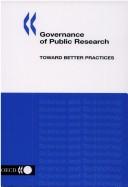
ISBN: 1280172193 9786610172191 9264103767 9264103740 Year: 2003 Publisher: Paris : OECD Publishing,
Abstract | Keywords | Export | Availability | Bookmark
 Loading...
Loading...Choose an application
- Reference Manager
- EndNote
- RefWorks (Direct export to RefWorks)
This report deals with public sector research. It provides a comprehensive review of the challenges that call for changes in the governance of OECD countries’ science systems. It highlights emerging policy responses developed in these countries indicating better practices to deal with the challenges, and draws policy lessons that can inspire the reform process. Supporting chapters provide detailed descriptions and analyses of the structures of science systems, the procedures for priority setting, the changes to funding, and the management of human resources in R&D.
Research. --- Research --- Science --- Physical Sciences & Mathematics --- Sciences - General --- Management --- Finance --- Personnel management --- Science research --- Scientific research --- Natural science --- Science of science --- Sciences --- Research management --- Information services --- Learning and scholarship --- Methodology --- Research teams --- Science. --- Management. --- Finance. --- Personnel management. --- Natural sciences
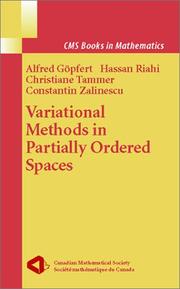
ISBN: 1280188278 9786610188277 0387217436 0387004521 Year: 2003 Publisher: New York, NY : Springer New York : Imprint: Springer,
Abstract | Keywords | Export | Availability | Bookmark
 Loading...
Loading...Choose an application
- Reference Manager
- EndNote
- RefWorks (Direct export to RefWorks)
In mathematical modeling of processes one often encounters optimization problems involving more than one objective function, so that Multiobjective Optimization (or Vector Optimization) has received new impetus. The growing interest in multiobjective problems, both from the theoretical point of view and as it concerns applications to real problems, asks for a general scheme which embraces several existing developments and stimulates new ones. In this book the authors provide the newest results and applications of this quickly growing field. This book will be of interest to graduate students in mathematics, economics, and engineering, as well as researchers in pure and applied mathematics, economics, engineering, geography, and town planning. A sound knowledge of linear algebra and introductory real analysis should provide readers with sufficient background for this book.
Mathematics. --- Operations research. --- Management science. --- Operations Research, Management Science. --- Vector spaces. --- Partially ordered spaces. --- Mathematical optimization. --- Quantitative business analysis --- Management --- Problem solving --- Operations research --- Statistical decision --- Operational analysis --- Operational research --- Industrial engineering --- Management science --- Research --- System theory
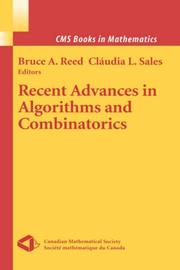
ISBN: 9786610009626 1280009624 0387224440 1468492683 0387954341 Year: 2003 Publisher: New York, NY : Springer New York : Imprint: Springer,
Abstract | Keywords | Export | Availability | Bookmark
 Loading...
Loading...Choose an application
- Reference Manager
- EndNote
- RefWorks (Direct export to RefWorks)
Combinatorics is one of the fastest growing fields of mathematics. One reason for this is because many practical problems can be modeled and then efficiently solved using combinatorial theory. This real world motivation for studying algorithmic combinatorics has led not only to the development of many software packages but also to some beautiful mathematics which has no direct application to applied problems. This book highlights a few of the exciting recent developments in algorithmic combinatorics, including the search for patterns in DNA and protein sequences, the theory of semi-definite programming and its role in combinatorial optimization, and the algorithmic aspects of tree decompositions and it's applications to the theory of databases, code optimization, and bioinformatics. Claudia Linhares-Sales is Assistant Professor of Computer Science at the Federal University of Cear, Brazil. Bruce Reed is Canada Research Chair in Graph Theory at the School of Computer Science of McGill University.
Combinatorial analysis. --- Combinatorics. --- Computer software. --- Discrete Mathematics. --- Algorithm Analysis and Problem Complexity. --- Operations Research, Management Science. --- Discrete mathematics. --- Algorithms. --- Operations research. --- Management science. --- Quantitative business analysis --- Management --- Problem solving --- Operations research --- Statistical decision --- Operational analysis --- Operational research --- Industrial engineering --- Management science --- Research --- System theory --- Algorism --- Algebra --- Arithmetic --- Combinatorics --- Mathematical analysis --- Discrete mathematical structures --- Mathematical structures, Discrete --- Structures, Discrete mathematical --- Numerical analysis --- Foundations

ISBN: 030648109X 140207302X Year: 2003 Publisher: New York, NY : Springer US : Imprint: Springer,
Abstract | Keywords | Export | Availability | Bookmark
 Loading...
Loading...Choose an application
- Reference Manager
- EndNote
- RefWorks (Direct export to RefWorks)
On March 15, 2002 we held a workshop on network interdiction and the more general problem of stochastic mixed integer programming at the University of California, Davis. Jesús De Loera and I co-chaired the event, which included presentations of on-going research and discussion. At the workshop, we decided to produce a volume of timely work on the topics. This volume is the result. Each chapter represents state-of-the-art research and all of them were refereed by leading investigators in the respective fields. Problems - sociated with protecting and attacking computer, transportation, and social networks gain importance as the world becomes more dep- dent on interconnected systems. Optimization models that address the stochastic nature of these problems are an important part of the research agenda. This work relies on recent efforts to provide methods for - dressing stochastic mixed integer programs. The book is organized with interdiction papers first and the stochastic programming papers in the second part. A nice overview of the papers is provided in the Foreward written by Roger Wets.
Computer security --- Computer networks --- Stochastic integrals --- Stochastic programming --- Security measures --- Mathematical optimization. --- Operations research. --- Management science. --- Electrical engineering. --- Calculus of variations. --- Decision making. --- Computers. --- Optimization. --- Operations Research, Management Science. --- Electrical Engineering. --- Calculus of Variations and Optimal Control; Optimization. --- Operations Research/Decision Theory. --- Theory of Computation. --- Automatic computers --- Automatic data processors --- Computer hardware --- Computing machines (Computers) --- Electronic brains --- Electronic calculating-machines --- Electronic computers --- Hardware, Computer --- Computer systems --- Cybernetics --- Machine theory --- Calculators --- Cyberspace --- Deciding --- Decision (Psychology) --- Decision analysis --- Decision processes --- Making decisions --- Management --- Management decisions --- Choice (Psychology) --- Problem solving --- Isoperimetrical problems --- Variations, Calculus of --- Maxima and minima --- Electric engineering --- Engineering --- Quantitative business analysis --- Operations research --- Statistical decision --- Operational analysis --- Operational research --- Industrial engineering --- Management science --- Research --- System theory --- Optimization (Mathematics) --- Optimization techniques --- Optimization theory --- Systems optimization --- Mathematical analysis --- Simulation methods --- System analysis --- Decision making --- Computer science. --- Operations Research, Management Science . --- Electrical and Electronic Engineering. --- Calculus of Variations and Optimization. --- Operations Research and Decision Theory.
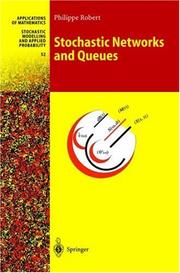
ISBN: 3540006575 3642056253 3662130521 Year: 2003 Volume: 52 Publisher: Berlin ; New York : Springer,
Abstract | Keywords | Export | Availability | Bookmark
 Loading...
Loading...Choose an application
- Reference Manager
- EndNote
- RefWorks (Direct export to RefWorks)
Queues and stochastic networks are analyzed in this book with purely probabilistic methods. The purpose of these lectures is to show that general results from Markov processes, martingales or ergodic theory can be used directly to study the corresponding stochastic processes. Recent developments have shown that, instead of having ad-hoc methods, a better understanding of fundamental results on stochastic processes is crucial to study the complex behavior of stochastic networks. In this book, various aspects of these stochastic models are investigated in depth in an elementary way: Existence of equilibrium, characterization of stationary regimes, transient behaviors (rare events, hitting times) and critical regimes, etc. A simple presentation of stationary point processes and Palm measures is given. Scaling methods and functional limit theorems are a major theme of this book. In particular, a complete chapter is devoted to fluid limits of Markov processes.
Queuing theory --- Stochastic analysis --- Files d'attente, Théorie des --- Analyse stochastique --- Queuing theory. --- Stochastic analysis. --- Files d'attente, Théorie des --- Probabilities. --- Operations research. --- Management science. --- Probability Theory and Stochastic Processes. --- Operations Research, Management Science. --- Quantitative business analysis --- Management --- Problem solving --- Operations research --- Statistical decision --- Operational analysis --- Operational research --- Industrial engineering --- Management science --- Research --- System theory --- Probability --- Statistical inference --- Combinations --- Mathematics --- Chance --- Least squares --- Mathematical statistics --- Risk
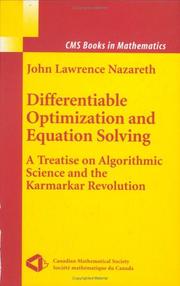
ISBN: 1280010010 9786610010011 0387217886 0387955720 Year: 2003 Publisher: New York, New York : Springer,
Abstract | Keywords | Export | Availability | Bookmark
 Loading...
Loading...Choose an application
- Reference Manager
- EndNote
- RefWorks (Direct export to RefWorks)
In 1984, N. Karmarkar published a seminal paper on algorithmic linear programming. During the subsequent decade, it stimulated a huge outpouring of new algorithmic results by researchers world-wide in many areas of mathematical programming and numerical computation. This book gives an overview of the resulting, dramatic reorganization that has occurred in one of these areas: algorithmic differentiable optimization and equation-solving, or, more simply, algorithmic differentiable programming. The book is aimed at readers familiar with advanced calculus, numerical analysis, in particular numerical linear algebra, the theory and algorithms of linear and nonlinear programming, and the fundamentals of computer science, in particular, computer programming and the basic models of computation and complexity theory. "Very fine monograph...filled with great insights." -Joseph F. Traub, Columbia University.
Mathematical optimization. --- Programming (Mathematics) --- Algorithms. --- Computer science --- Computational Mathematics and Numerical Analysis. --- Mathematical Modeling and Industrial Mathematics. --- Operations Research, Management Science. --- Optimization. --- Mathematics. --- Computer mathematics. --- Mathematical models. --- Operations research. --- Management science. --- Optimization (Mathematics) --- Optimization techniques --- Optimization theory --- Systems optimization --- Mathematical analysis --- Maxima and minima --- Operations research --- Simulation methods --- System analysis --- Algorism --- Algebra --- Arithmetic --- Quantitative business analysis --- Management --- Problem solving --- Statistical decision --- Operational analysis --- Operational research --- Industrial engineering --- Management science --- Research --- System theory --- Models, Mathematical --- Computer mathematics --- Electronic data processing --- Mathematics --- Foundations
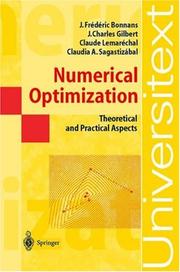
ISBN: 3540001913 3662050781 9783540001911 Year: 2003 Publisher: Berlin: Springer,
Abstract | Keywords | Export | Availability | Bookmark
 Loading...
Loading...Choose an application
- Reference Manager
- EndNote
- RefWorks (Direct export to RefWorks)
Starting with illustrative real-world examples, this book exposes in a tutorial way algorithms for numerical optimization: fundamental ones (Newtonian methods, line-searches, trust-region, sequential quadratic programming, etc.), as well as more specialized and advanced ones (nonsmooth optimization, decomposition techniques, and interior-point methods). Most of these algorithms are explained in a detailed manner, allowing straightforward implementation. Theoretical aspects are addressed with care, often using minimal assumptions. The present version contains substantial changes with respect to the first edition. Part I on unconstrained optimization has been completed with a section on quadratic programming. Part II on nonsmooth optimization has been thoroughly reorganized and expanded. In addition, nontrivial application problems have been inserted, in the form of computational exercises. These should help the reader to get a better understanding of optimization methods beyond their abstract description, by addressing important features to be taken into account when passing to implementation of any numerical algorithm. This level of detail is intended to familiarize the reader with some of the crucial questions of numerical optimization: how algorithms operate, why they converge, difficulties that may be encountered and their possible remedies. .
Numerical methods of optimisation --- Operational research. Game theory --- Mathematical optimization --- Computer algorithms. --- Mathematical optimization. --- Numerical analysis --- Data processing. --- Computer algorithms --- Engineering & Applied Sciences --- Applied Mathematics --- Data processing --- Operations research. --- Management science. --- Calculus of variations. --- Numerical analysis. --- Algorithms. --- Computer science—Mathematics. --- Optimization. --- Operations Research, Management Science. --- Calculus of Variations and Optimal Control; Optimization. --- Numerical Analysis. --- Algorithm Analysis and Problem Complexity. --- Mathematics of Computing. --- Algorism --- Algebra --- Arithmetic --- Mathematical analysis --- Isoperimetrical problems --- Variations, Calculus of --- Maxima and minima --- Quantitative business analysis --- Management --- Problem solving --- Operations research --- Statistical decision --- Operational analysis --- Operational research --- Industrial engineering --- Management science --- Research --- System theory --- Optimization (Mathematics) --- Optimization techniques --- Optimization theory --- Systems optimization --- Simulation methods --- System analysis --- Foundations --- Optimisation mathématique
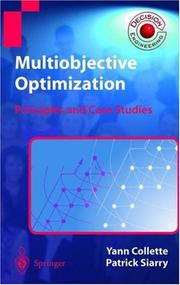
ISBN: 3540401822 3642072836 3662088835 9783540401827 Year: 2003 Publisher: Berlin: Springer,
Abstract | Keywords | Export | Availability | Bookmark
 Loading...
Loading...Choose an application
- Reference Manager
- EndNote
- RefWorks (Direct export to RefWorks)
From whatever domain they come, engineers are faced daily with optimization problems that requires conflicting objectives to be met. This monograph systematically presents several multiobjective optimization methods accompanied by many analytical examples. Each method or definition is clarified, when possible, by an illustration. Multiobjective Optimization treats not only engineering problems, e.g in mechanics, but also problems arising in operations research and management. It explains how to choose the most suitable method to solve a given problem and uses three primary application examples: optimization of the numerical simulation of an industrial process; sizing of a telecommunication network; and decision-aid tools for the sorting of bids. This book is intended for engineering students, and those in applied mathematics, algorithmics, economics (operational research), production management, and computer scientists.
Mathematical optimization. --- Mathematical models. --- Operations research. --- Decision making. --- Management science. --- Control engineering. --- Robotics. --- Mechatronics. --- Mathematical Modeling and Industrial Mathematics. --- Operations Research/Decision Theory. --- Operations Research, Management Science. --- Optimization. --- Control, Robotics, Mechatronics. --- Mechanical engineering --- Microelectronics --- Microelectromechanical systems --- Automation --- Machine theory --- Control engineering --- Control equipment --- Control theory --- Engineering instruments --- Programmable controllers --- Optimization (Mathematics) --- Optimization techniques --- Optimization theory --- Systems optimization --- Mathematical analysis --- Maxima and minima --- Operations research --- Simulation methods --- System analysis --- Quantitative business analysis --- Management --- Problem solving --- Statistical decision --- Deciding --- Decision (Psychology) --- Decision analysis --- Decision processes --- Making decisions --- Management decisions --- Choice (Psychology) --- Operational analysis --- Operational research --- Industrial engineering --- Management science --- Research --- System theory --- Models, Mathematical --- Decision making
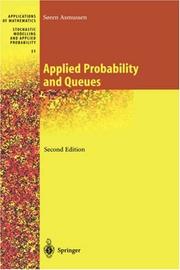
ISBN: 1280188189 9786610188185 0387215255 0387002111 Year: 2003 Volume: 51 Publisher: New York : Springer,
Abstract | Keywords | Export | Availability | Bookmark
 Loading...
Loading...Choose an application
- Reference Manager
- EndNote
- RefWorks (Direct export to RefWorks)
Stochastic processes. --- Queuing theory. --- Markov processes. --- Probability theory --- Stochastic processes --- Queuing theory --- Markov processes --- Processus stochastiques --- Files d'attente, Théorie des --- Markov, Processus de --- EPUB-LIV-FT SPRINGER-B --- Mathematics. --- Operations research. --- Decision making. --- Management science. --- Probabilities. --- Industrial engineering. --- Production engineering. --- Probability Theory and Stochastic Processes. --- Operations Research, Management Science. --- Industrial and Production Engineering. --- Operation Research/Decision Theory. --- Distribution (Probability theory. --- Operations Research/Decision Theory. --- Deciding --- Decision (Psychology) --- Decision analysis --- Decision processes --- Making decisions --- Management --- Management decisions --- Choice (Psychology) --- Problem solving --- Manufacturing engineering --- Process engineering --- Industrial engineering --- Mechanical engineering --- Management engineering --- Simplification in industry --- Engineering --- Value analysis (Cost control) --- Quantitative business analysis --- Operations research --- Statistical decision --- Operational analysis --- Operational research --- Management science --- Research --- System theory --- Probability --- Statistical inference --- Combinations --- Mathematics --- Chance --- Least squares --- Mathematical statistics --- Risk --- Decision making --- Analysis, Markov --- Chains, Markov --- Markoff processes --- Markov analysis --- Markov chains --- Markov models --- Models, Markov --- Processes, Markov --- Erlang traffic formula --- Queueing theory --- Theory of queues --- Waiting-line theory --- Production scheduling --- Random processes --- Probabilities
| Listing 1 - 10 of 13 | << page >> |
Sort by
|

 Search
Search Feedback
Feedback About UniCat
About UniCat  Help
Help News
News